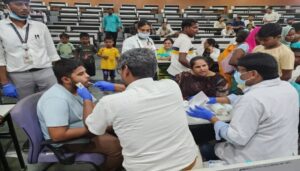Bihar Health Dept on High Alert Amid India-Pak Tensions, Emergency Protocols Activated

Patna: In light of escalating tensions between India and Pakistan, the Bihar Health Department has initiated a comprehensive emergency preparedness plan across all districts, particularly in sensitive border areas. Medical institutions have been directed to remain on high alert, with dedicated infrastructure and staff readied to respond to any potential crisis.
In a high-level virtual review meeting held on Friday, Development Commissioner and Additional Chief Secretary (Health) Pratyaya Amrit, along with State Health Committee Executive Director Suharsh Bhagat, briefed all civil surgeons, medical college superintendents, principals, and medical officers on the urgent need to strengthen medical readiness.
Quick Response Teams and 24×7 Emergency Services Ordered
Hospitals have been instructed to activate Quick Medical Response Teams, consisting of doctors and paramedical staff, in every district. These teams will be tasked with providing immediate medical assistance in the event of any emergency.
Key facilities—including operation theatres, ICUs, high dependency units (HDUs), and emergency wards in medical college hospitals—are to remain operational round-the-clock. Civil surgeons have been ordered to arrange for dedicated hospital beds for potential casualties.
Oxygen, Power Backup, and Staff Rosters to Be Secured
Highlighting the critical need for uninterrupted treatment, Pratyaya Amrit emphasized the importance of a steady supply of oxygen. “Hospitals must ensure a functional stock of oxygen cylinders and concentrators,” he said, adding that separate duty rosters of specialist doctors, general physicians, nurses, and support staff should be maintained for emergency deployment.
Given the risk of power outages, all health facilities have been asked to arrange for backup power systems, including generators and battery inverters, to avoid any disruption in medical care.
Ambulance Readiness and Control Rooms
The Health Department has also ordered that ambulances be kept on standby in all districts, with instructions to designate dedicated ambulances for critical patients requiring immediate care during the golden hour.
To coordinate the medical emergency efforts, every district has been directed to establish a 24×7 control room, with the Civil Surgeon acting as the nodal officer at the district level and the Medical Officer in Charge at the block level taking charge locally.
Officials stressed that these precautionary measures are vital to ensuring a swift and coordinated medical response in case of any eventuality linked to the geopolitical situation.








